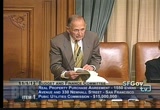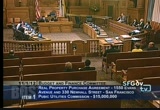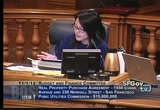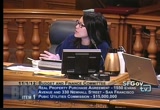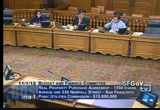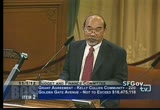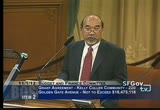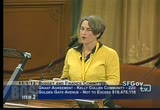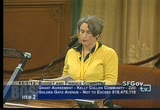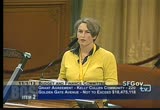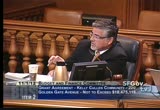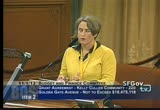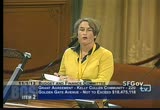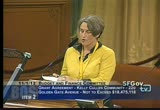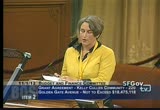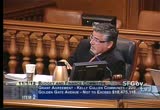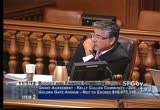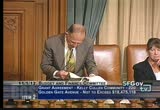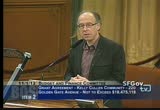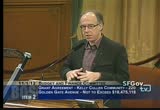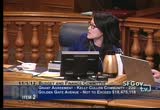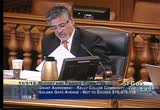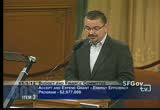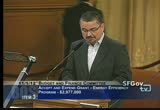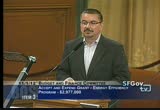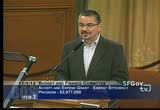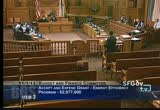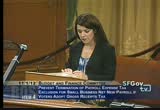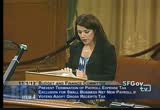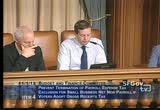tv [untitled] November 3, 2012 10:30am-11:00am PDT
10:30 am
the sewer system improvement program, staff and equipment, as well as the wastewater collection division. now on the othered and, we point out on page 7 of our report that if the puc were to lease instead of purchase comparable property, new properties, to get a centralized location, then it is shown in table 4 on page 8 of our report the net present value of such lease is over 30 years is an estimated $23.1 million, which is $4.9 million or 27% more than the net present value of the estimated purchase price/relocation and occupancy costs, as well as the financion costs over a 30-year period that. would be an estimated $18.1 million. so
10:31 am
our our conclusion because it includes new costs for the pucks, as compared to continuing to lease at the existing locations, therefore, we say it's a policy matter, even though we acknowledge that if the supervisors agree with the department to centralize in one location, it appears that the city would be getting a good deal. >> thank you, mr. rose. sean? >> mr. rose, and maybe this is puc too, and maybe you might not know harvey, the current lease analysis that you did, if we kept it for 30 years, what are the current terms of lease? do we have those leases for the next 30 years at the same rent? >> no, we made a projection. it's a combination of leases and city-owned property. and we simply made a projection to get a net present value. >> okay. so it's an
10:32 am
expectation of 15 years from now what the property owner would be charging the city. >> exactly. >> fair enough. ? >> supervisor kim? >> thank you. i do have a quick question for mr. updyke from real estate. and it's actually just a tangential question. with regards to the two sites with the fire department and with dpw that the puc will no longer be utilizing and i nose it's not a cost-savings to the puc because they weren't paying to use it. are there ways fort departments to generate revenue from the sighs now that the puc will no longer be occupying it? >> supervisor kim with respect to the property particularly that is associated with fire, i believe that [shr-r/] in
10:33 am
discussion amongst dpw, my staff and capital planning. so i think we're looking at reuse, where possibility, where we're vacating or pulling certain uses off city-owned property s. >> so i'm sorry for 2245 gerald? >> that would be gerald. >> so the fire department may reuse that site now? >> yes. >> it would be great to learn how we reutilize sites or see if there are ways of generating -- i don't know if they are releasable. >> we're looking at a broader picture of all the industry yard needs that the city has. they are quite numerous. this board deliberated over an issue recently with the mta, that i think brought to light some of the challenges that we have to find industrial uses. there is only so much within the city footprint and we're looking can we con sodate the uses to have search for a
10:34 am
whole number of options. so we're having those discussions to have a consolidated discussion going forward and i execute [spwr-eubg/]ing something forward to you to discuss that. >> thank you. >> let's open the item up for public comment. any member of the public who wishes to comment, please come forward. seeing no one come forward, we'll close public comment. colleagues, we have this item before us. can we have a motion to approve this resolution and send forward with recommendation. >> so moved. and we can move forward as a committee report for the tuesday meeting? okay. we'll take that without objection. >> that will be forwarded as a committee report to the november 6th board of supervisors' meeting. >> very good. item no. 2, please? >> item no. 2, resolution authorizing the director of the mayor's office of housing to execute a local operating subsidy program grant agreement with 220 golden gate master tenant lp to provide operating
10:35 am
subsidies for formerly homeless single adults at kelly cullen community, 220 golden gate amp for the period of december 1,2012 to november 30, 2027 napolit not to exceed $18,475,118. >> very good. we have the mayor's office of housing. good morning, supervisors. i will dot introduction and then lydia ely from my office, who is the project manager will give you the details. we are here to seek the committee's recommendation on this local operating subsidy program contract. this is a continuation of our collaboration with the city's department of public health, where the mayor's office has provided capital for the development of affordable housing, and we are working with the department of public
10:36 am
health to basically subsidize the operation of the facility. so that the department can ensure that it can meet its goals of serve formerly homeless medically-frail individuals. and this project is just one in a series of projects that we're doing with the department of public health. we're also doing similar projects with the human services agency and this projected is a 15-year contract for the operating subsidies for the kelly cullen community facility. and i will bring up lydia ely to talk about the details of the particular project and the subsidy itself. >> good morning supervisors, lydia ely, project supervisor
10:37 am
at the mayor's office of housing. i wanted to talk about the local subsidy program and its genesis and goals before we talk about kelly cullen community and the specificked of that project. the local operating subsidy program has been operated by our office since 2005. and it was created out of a need -- out of the recognition that we needed a local source for operating supportive housing. the ten-year plan to abolib chronic homelessness, which was drafted in 2004, set a goal of 3,000 units for formerly homeless people. however, we did not have a local source to keep those units -- to operate those units in the long-term. federal sources such as section 8, shelter plus care, were scarce and have become even more scarce since that time. so the local operating subsidy program supports operating costs -- only when no other
10:38 am
subsidy is available. right now, in the 2012-2013 fiscal year, we're operating 1027 units, across projects in the city. in 17 different projects. most of those units are for single adults. however, we do have 111 units for families. the project is based on the concept that providing housing is not only more humane, but faze it's also more cost-effective than providing inertia or leaving people to the streets. we find savings in public health care costs and the emergency health care system and wait the program as mr. lee explains these are general funds. and we underwrite the contracts
10:39 am
and implement the contracts and monitor the contracts. >> was there -- just when the program was established in 2005 -- what were the sources that general fund dollars that came from? was that both from hsa and dph? >> yes, it was. the first project was the hotel essex and that was an hsa project. i would say at this point, i don't have it in front of me, but i would say about two-thirds of the units are dph units and one-third are hsa units. >> you say we created a funding stream for it, but basically we just took general fund dollars and call it local operating subsidy program dollars now. what was not funded? what were those dollars potentially used for before that? was that ga? hsa? and something else dph is trying to get background on the
10:40 am
program itself. honestly, i don't know. with the overlay being this is a prudent use of -- preferable to emergency services and the costs in the best of all worlds would be the dollars -- the best all worlds would be emergency services dollars that were no longer used. i'm not sure if that is actually happening in the real world. >> so we might be able to describe some cost-savings by having a program that has the services where people live and actually yields greater cost-savings that could be a source of funding? i see miss campbell standing up. >> chair, if i understand your question, these are routine general fund monies subject to appropriation each year in the hsa and dph budget. there is not a particular funding source other than the general fund.
10:41 am
>> thank you, please continue. >> so projects that receive local operating subsidy dollars for the operating are also receiving funds for support services from the same agency, city agency, that is originating the general funds. in this case the department of puck health is entering into a contract for supportive services at the site. the good news with this particular project it received a large grant for services, the social innovation fund, which is a federal grant that is funneled through kind of an intermediary has made a two-year award to the project. and the great news also about that is that there is a full evaluation of the program that will be funded by the grant. so the analyst's report recommends that the outcomes and findings of that evaluation be shared here at the board and we're really excited about that. because we do have information
10:42 am
about cost-savings. there is a large body of research on the cost-effectiveness of supportive housing. we have a digest of a number of those studies and the study was done in san francisco about five years ago of the plaza hotel. we can share that with you. so the project at-hand is the kelly cullen community located at 220 golden gate. this is also known as the former central ywca. this is our largest project to-date. the project will provide 174 units -- i'm sorry 172 units plus two managers units for formerly hopeless individuals with the greatest medical, behavioral health and housing needs. construction is wrapping up as we speak. and tenants will gib and begin moving in december 1st and all units will be occupied by the end of may,
10:43 am
2013. all units offer kitchenettes andprived bath and there are a credits. this is a historic site and a great deal of effort has gone into preserving the unique features of the building. on the ground floor we are pleased to have partnered with dph to create 11,000 square foot public health clinic. this is a brand-new state-of-the-art facility, that is also being completed on the same schedule and will be opened for business on january 1st. it will serve the tenants, but also the greater tenderloin community. so that is a great, new asset to our city. one thing that i would like to mention about the local
10:44 am
operating subsidy, that is a very powerful aspect of it is that its existence makes it possible to bring capital sources to these projects that otherwise we not get buzz we are ensuring an ongoing income stream for these projects. and on the with that income stream will investors and lendors participate in the development n. this particular case, the building costs for 220 golden gate, kelly cullen community were funded by over $50 million in arra stimulus fund, $20 million in local city funds. state funds through the mental health services act. about $15 million in private equity. and some private bank funds to the affordable housing program. so it's because of the localing operating subsidy that the project pencils and that we
10:45 am
can bring these tremendous resources to the development of the project. so that concludes my presentation. i would be happy to answer any questions. >> thank you before. we go into the budget analyst, just a quick question about the different health clinic services in the area. are we seing a movement from waddell or other services that are going to be -- is the whole operation of public health clinic services changing in the tenderloin and how does it interact with other services? >> dph staff couldn't come because of schedule change but this will be the focus of new homeless and tom lydell will still exists a clinic, but this clinic will be the new centralized location for homelessness services. there will be a full array of
10:46 am
behavioral health, mental health, nurse practitioners, and not just for homeless people and not just for the residents, but part of the city's clinic system. >> so tom waddell will answer as well. >> i'm corin buchanan department of public health. tom waddell will stay open as an emergency site, but the main operation will move to this site. >> thank you. let's move to the budget report pled guilty rose. >> mr. chair and members of committee, on page 8 of our report, we have a table 1 and that table shows that the kelly
10:47 am
cullen community will receive subsidies for 172 units at an average estimated subsidy of $601 per units, per month, that is for the 172 units and over the 15-year term of the agreement as you can see in table 5, the total estimated costs are $18,475,118 and they are general fund costs as miss campbell has stated. we recommend that you approve this resolution as consistent with previous board policy on other similar agreements. we also recommend that you request that the department of puck health report to the budget and finance county full board of supervisors on the findings from the new york university study on housing and health outcomes.
10:48 am
and i really just want to reiterate or add a couple of points. this demonstrates something that we all know about homelessness and this is the important link with health. so we're really proud to have put together this project with clinic on the ground floor. second, the social innovation fund grant that miss ely referred to was a hypercompetitive national competition of which there were only four recipients and so we're really pleased not only that the project was deemed worthy to win the competition,
10:49 am
but also that it will bring resources that will directly reduce the amount of money that the department of public health has to pay for the project for services. it's a two-year grant with a potential for a three-year extension. and then finally, i just want to highlight that this project is a partnership in the most genuine meaning of the term. at tmdc is maybe on the title and we are the owner, but it's generally a community asset of which we are merely the stewards. the department of public health, the mayor's office of housing, the state and federal government and many other parties came together to bring the project to fruition and it would not have happened with anyone. thank you. >> thank you very much. if there have are no other
10:50 am
members of public, we will close public comment. supervisor kim. >> i want to say had you appreciative of the project and it's exciting and it's a beautiful, beautiful building and it will be great to see this finally opened by the end of the year, is that right? to be permanently supportive housing and a public clinic space for dph. i know to speaking to the staff at tom waddell, they have been looking for a space that is more conducive and welcoming to our most vulnerable residents and patients and think it's greater that they have a welcoming site right in the heart of tenderloin at the y. i had an opportunity to go on a tour with don flak so i'm happy to move this forward with a motion to approve and also as a committee report.
10:51 am
>> we could take that without objection. also before we actually i gavel down, i would like to get a tour of the site to work that in the next month or so. it would be great and i know it's a great milestone for our city that this project is coming to fruition. so we'll approve that. send it forward as a committee report with recommendation. [ gavel ] thank you item no. 3, please. >> item no. 3, resolution retroactively authorizing the department of environment to spend a grant in the amount of $2,977,000 from the california public utilities commission through pacific gas & electric company to continue with an energy use and demand reduction through energy-efficiency program in the city and county of san francisco for the period
10:52 am
of october 15th, 2012 through december 31, 2012. >> mr. rodriguez, welcome. >> thank you, guillermo rodriguez, department of the environment. the department is requesting the committee's approval to accept and expend a grant in the amount of $2,977,000 from the california public utilities commission through pacific gas & electric company to continue an energy use and demand reduction through energy-efficiency program through the period of october 15 of this year through december 31 of this year. it working cooperatively with pg&e and additional funding is being allocated to the city to accelerate approximately 450 businesses and multi-family projects totaling about 3 million megawatts in savings. the savings of the 450 projects is significant just to give you
10:53 am
an example of what 3 megawatts of savings equivalent to running 3,000 san francisco homes for a year. so these 450 projects are important. a few examples of the project certainly include familiar places at&t park and the fresh fish market at geneva is one of our projects. pacific supermarket on 2900 almaine is a project. the catholic charities building on 1948 ocean is a project. we have some large projects like the palace hotel. we just heard tenderloin housing clinic is one of our other projects and conrad house is a project. the examples of the type of
10:54 am
work are really very individual to each site, but a lot of it is for commercial office laguardias, commercial overhead lighting and a lot of it is changing their lighting for a new led project. in addition, there is lots of several kind of therm projects or natural gas projects that are included. in this next round. the last time i came before this committee there was an interest in understanding better our geographic representation of where historically the department has provided incentives and i provided the committee members -- and if i could have the overhead. this represents the example of the various programs that the department has had throughout the existence of these programs. the bulk of our programs are
10:55 am
for commercial, and large multi-family housing units. and gives you just a sense of the projects and where they have been throughout san francisco. not only have businesses and residents saved money from these programs and we have had the positive benefits on the environment in terms of greenhouse gas reductions. but in some of the contractors performing the work, also employee local folks here in san francisco, are able to continue that program. we estimate about a little over $20 million that residents and businesses have saved. instead of writing a check out on a monthly basis they have been able to keep that here in san francisco. and it's been a very positive aspect. the department wishes to recognize pg&e for their help in expediting this process, so that we can complete a lot of this work, this calendar year. i urge the committee's acceptance of the grant and my
10:56 am
colleague ann kelly and myself are here to answer any questions. thank you. >> great. thank you for your presentation. this item does not have a budget analyst's report. so we can go on to public comment. and seeing no member of the public come forward for public comment. we will close public comment. thank you. and colleagues, can we have a motion to move this forward as a committee report to the november 6th board of supervisors' meeting with recommendation? we'll take that without objection [ gavel ] ment i. no. 4, please. >> i. no. 4, ordinance amending the san francisco business and tax regulation code article 12a by amending section 906.5 to priest the payroll expense tax exclusion for small business net new payroll for years 2012 through 2015 from terminating in event that the voters of the city and county of san francisco pass a gross receipts tax.
10:57 am
>> thank you victor. we have legislationoff aide to supervisor farrell, catheryn stephanie, welcome. >> good morning, supervisors, cathery stephanie, lengthiest aide to supervisor farrell. what have you before you is clean-up legislationings that follows our payroll tax exclusion legislation that was drafted before the gross receipts ballot language was finalized and submitted. so it was originally drafted and legislation will actually terminate upon passage of the gross receipts tax prior to the end of 2012. of course that is assuming that proposition e does pass on november 6th. this legislation before you amends it, so it no it longer terminates november 6th and allows the exemption to remain in effect for tax years 2012-2015. if the gross receipts tax does pass, the city's payroll expense tax would phase out
10:58 am
from tax years 2014 through 2018 and ted is here to explain how the facout is going to work with the exclusion. as you recall the purpose of the payroll tax exclusion for small businesss is to create and increase the number of jobs within the city and county of san francisco. by providing an incentive for small businesses to create new jobs. the legislation before you today will allow that to happen by keeping the exemption in place through 2015 as originally intended. there are two recommendations in the budget legislative analyst's report that supervisor farrell is fine with. we also have an additional amendment that ted egan is here to explain, lines 14-16 and i have copies of that. again, mr. egan will explain that why it's necessary to calculate the base year payroll tax with the phase-in and exempting. so if i could give
10:59 am
this to victor. with that i would either ask that you go to the budget legislative analyst or to ted egan. >> why don't we go to mr. egan first and then to the budget analyst. mr. egan. >> good morning, supervisors, ted egan, controller's office. the effect of this legislation will really be to bring the exclusion brand new in line with the way other payroll tax exclusions would be treated in the event that the gross receipts tax passes. effectively what that means is that the incentive will remain in place, which is to say businesses will be able to exclude growth in their payroll expense up to $250,000. through 2015. however, because the payroll tax rate will
150 Views
IN COLLECTIONS
SFGTV: San Francisco Government Television Television Archive
Television Archive  Television Archive News Search Service
Television Archive News Search Service 
Uploaded by TV Archive on

 Live Music Archive
Live Music Archive Librivox Free Audio
Librivox Free Audio Metropolitan Museum
Metropolitan Museum Cleveland Museum of Art
Cleveland Museum of Art Internet Arcade
Internet Arcade Console Living Room
Console Living Room Books to Borrow
Books to Borrow Open Library
Open Library TV News
TV News Understanding 9/11
Understanding 9/11